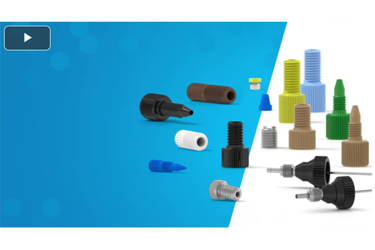Polymer Information

Polymer fittings and ferrules have become a preferred choice over stainless steel in many high-performance liquid chromatography (HPLC) and analytical applications due to their broad chemical resistance, mechanical strength, and cost-effectiveness. IDEX Health & Science provides solvent compatibility data for commonly used polymers such as Delrin®, PCTFE, PEEK, polypropylene, PPS, FEP, PFA, and Tefzel®, highlighting each material’s performance with solvent classes like aromatics, ketones, aldehydes, amines, and acids.
Among these, PEEK stands out for its excellent resistance to both organic and inorganic liquids, and it is widely used for nuts, ferrules, and tubing. However, certain solvents like DMSO and THF may cause PEEK tubing to swell, though fittings remain unaffected. FEP and PFA offer near-universal chemical inertness and are excellent for fluid pathways, with PFA favored in high-purity applications. PCTFE also exhibits excellent solvent resistance and is well-suited for sealing surfaces.
Delrin®, while strong and wear-resistant, is unsuitable for use with acids, bases, or oxidizing agents. Polypropylene is best for low-pressure, aqueous applications, as it is vulnerable to aromatic and chlorinated solvents. PPS offers great chemical resistance at room temperature but should be avoided with chlorinated solvents and elevated temperatures. Tefzel® (ETFE) provides superior tensile strength and is more pressure-resistant than PTFE, although it may swell with certain chlorinated solvents.
Each polymer’s maximum recommended operating temperature and thread strength varies, making material selection crucial for application-specific performance, safety, and durability in HPLC systems.
Get unlimited access to:
Enter your credentials below to log in. Not yet a member of Med Device Online? Subscribe today.
